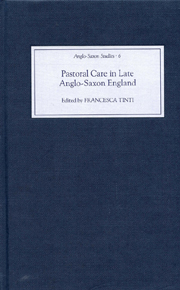Book contents
- Frontmatter
- Contents
- List of illustrations
- List of contributors
- Abbreviations
- Introduction
- 1 The clergy in English dioceses c. 900–c. 1066
- 2 The ‘costs’ of pastoral care: church dues in late Anglo-Saxon England
- 3 Ælfric in Dorset and the landscape of pastoral care
- 4 Is there any evidence for the liturgy of parish churches in late Anglo-Saxon England? The Red Book of Darley and the status of Old English
- 5 Remedies for ‘great transgressions’: penance and excommunication in late Anglo-Saxon England
- 6 The pastoral contract in late Anglo-Saxon England: priest and parishioner in Oxford, Bodleian Library, MS Laud Miscellaneous 482
- 7 Caring for the dead in late Anglo-Saxon England
- Index
5 - Remedies for ‘great transgressions’: penance and excommunication in late Anglo-Saxon England
Published online by Cambridge University Press: 12 September 2012
- Frontmatter
- Contents
- List of illustrations
- List of contributors
- Abbreviations
- Introduction
- 1 The clergy in English dioceses c. 900–c. 1066
- 2 The ‘costs’ of pastoral care: church dues in late Anglo-Saxon England
- 3 Ælfric in Dorset and the landscape of pastoral care
- 4 Is there any evidence for the liturgy of parish churches in late Anglo-Saxon England? The Red Book of Darley and the status of Old English
- 5 Remedies for ‘great transgressions’: penance and excommunication in late Anglo-Saxon England
- 6 The pastoral contract in late Anglo-Saxon England: priest and parishioner in Oxford, Bodleian Library, MS Laud Miscellaneous 482
- 7 Caring for the dead in late Anglo-Saxon England
- Index
Summary
The act of penance, in Burchard of Worms' words, both corrects the bodies of sinful men, and acts as medicine for their souls. The tension between its disciplinary and curative aspects will be explored in this two-part study, focusing firstly on the attempts by the higher clergy in the late Anglo-Saxon Church to ensure that devotional penance played a regular part in the life of every Christian, and secondly on the provisions made for those contumacious sinners who refused to come to penance.
PENANCE
Penance is a vague term, and what is meant by paenitentia is not always clear. The clergy of late Anglo-Saxon England knew and repeated the penitential dichotomy first articulated by the early ninth-century Carolingian reformers: in Ælfric's words ‘secret sins shall be expiated secretly, and open openly, that those may be edified by his repentance who had previously been seduced by his sins’. Secret penance could be administered by any priest at any time, as long as he followed the guidance on tariffs for individual sins set out in a penitential, but public penance remained an episcopal prerogative; entry into public penance was restricted to a public service on Ash Wednesday, in which the penitent was expelled, physically and metaphorically, from the Church, whilst on Maundy Thursday he was reconciled with and re-entered the Church. This division was never in practice as straightforward as the Carolingian legislation suggested it should be, but nevertheless there has been a tendency amongst historians of penance, both for Anglo-Saxon England and the Continent, to concentrate on ‘secret’ penance and ignore the evidence for its public counterpart.
- Type
- Chapter
- Information
- Pastoral Care in Late Anglo-Saxon England , pp. 83 - 105Publisher: Boydell & BrewerPrint publication year: 2005



